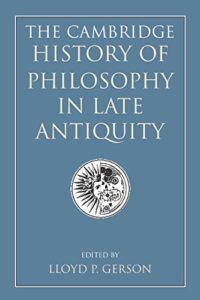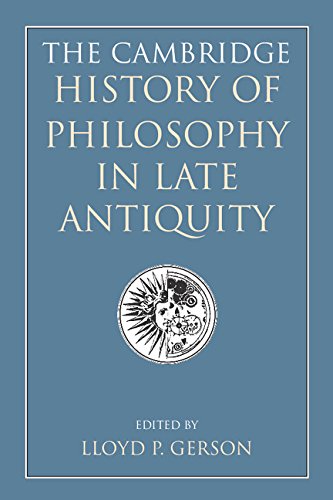 The Cambridge History of Philosophy in Late Antiquity, edited by Lloyd P. Gerson (Cambridge: Cambridge University Press, 2015), 1284 pages.
The Cambridge History of Philosophy in Late Antiquity, edited by Lloyd P. Gerson (Cambridge: Cambridge University Press, 2015), 1284 pages.
In 1967, The Cambridge History of Late Greek and Early Medieval Philosophy was published. Since then, numerous critical editions and studies of philosophers in this period have appeared, and historians of antiquity have now shifted from speaking of an early medieval period to “late antiquity,” something noted also in a recent companion to Augustine. This new volume, The Cambridge History of Philosophy in Late Antiquity, brings older discussions up to date and adds new purposes to the two-volume set.
About fifty scholars contributed to these two volumes, which allows a high level of specialization. The essays begin with a brief socio-historical sketch to provide context for each philosopher, but the main focus is their philosophical positions. Essays are broad and introductory, but extensive enough to provide readers with enough information about each figure to satisfy one’s curiosity and set the reader on the path for further study. At the end is an appendix of all philosophers of this period and their works.
The unique feature of this “history of philosophy” volume is that it includes theologians who encountered and dealt with philosophical concepts and terminology in their writings. So part 1 introduces the reader to philosophy at the beginning of the period, while part two discusses Christianity’s first encounter with Greek philosophy. These chapters cover Philo, Justin Martyr, Clement of Alexandria, and Origen.
Parts 3 and 4 cover Plotinus and those who followed his philosophy (the editor eradicated all references to “Neoplatonism,” given its roots as a pejorative eighteenth-century German term that incorrectly suggests innovation) as well as philosophy in the age of Constantine. Much of the value of this volume is its comprehensive coverage of the figures in these periods. Most histories of philosophy might cover Augustine, Plotinus, Boethius, and a few more minor figures before Aquinas. But this volume covers Plotinus, Porphyry and his school, Iamblichus and his school, Themistius, Thoen of Alexandria and Hypatia, and Hierocles of Alexandria.
Part 5 covers what the editor has called “the second encounter of Christianity with ancient Greek philosophy.” Here the coverage of Christian theologians widens, analyzing Basil of Caesarea, Gregory of Nyssa, Gregory of Nazianzus, Calcidius, Nemesius of Emesa, Synesius of Cyrene, Marius Victorinus, and Augustine. Aristotle’s works had been largely lost during this period, so Christians were predominantly encountering Platonist ideas as a rival system to Christian thought.
Part 6 includes 10 essays on “late Platonic” writers, while part 7 covers the “third encounter” of Christianity with ancient Greek philosophy. This last group of Christian theologian-philosophers includes Pseudo-Dionysius the Areopagite, Boethius, Maximus the Confessor, and John Scotus Eriugena. The inclusion of Maximus is significant because of his importance as a theologian of the East and his foundational role for the Orthodox. Also pleasing is the chapter on Eriugena and its analysis of the use of Augustine’s thought.
The final part of this volume leads into the Byzantine period, with an introductory chapter surveying the early part of this period. The second chapter covers the origins of Islamic philosophy, which may have been appropriately entitled “Islam’s first encounter with Greek philosophy.” At this early stage Aristotle’s works had not yet been re-discovered and appropriated widely by Islamic, Christian, and Jewish scholars, so Islam, like Christianity, had to wrestle with Plato’s children. The final chapter provides a historical analysis of the end of “late antiquity” and the beginning of medieval philosophy.
These two volumes make a comprehensive and useful set for any library. Very few figures are omitted and the inclusion of Christian theologians and even Philo enriches the social history to be learned from these fifty scholars. While the ideas of each philosopher are important, it is important for understanding these ideas to know with whom they interacted, in what context their ideas were generated and propagated, and for what purpose their wrote their treatises. Perhaps more than in any other disciplines people have the impression that philosophers wrote their treatises in ivory towers, but in reality social history can often enlighten their positions (e.g., did the fact that Socrates was put to death by a democratic vote have anything to do with Plato’s denigration of democracy as the worst political form?).
In summary, these volumes are equally valuable for philosophers, historians of late antiquity, and theologians. They are also valuable for those who study earlier phases of Greek thought, since later periods of history shed light on what came before. While the hardback versions are expensive, they have thankfully been produced as paperbacks as well for a more affordable price.
Preview or buy them here on Amazon.


